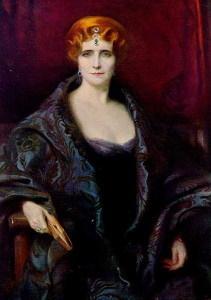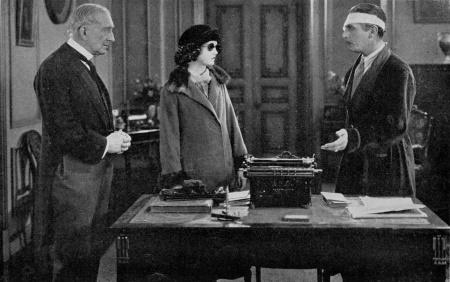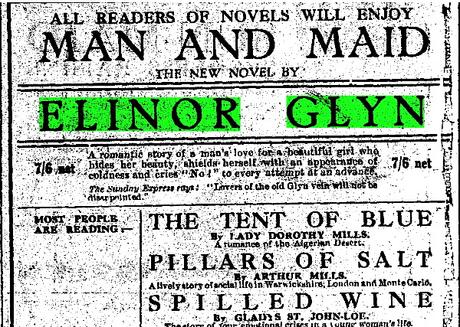 Elinor Glyn
Elinor Glyn
Book Review by George S: This is a thoroughly unpleasant book. It takes the form of the journal of Sir Nicholas Thormonde, who has been wounded in the Great War:
I am sick of my life-The war has robbed it of all that a young man can find of joy.
I look at my mutilated face before I replace the black patch over the left eye, and I realize that, with my crooked shoulder, and the leg gone from the right knee downwards, that no woman can feel emotion for me again in this world.
Invalided from the Army, he is in Paris during 1918. His acquaintances all belong to the leisure class; especially, there is a group of women friends who see no reason why war should interfere with their life of pleasure:
Germans may be attacking Paris - Friends and relations may be dying in heaps, but women must have new clothes and fashion must have her say as to their shapes - And what a mercy it is so! If there was nothing to relieve war and seriousness - all the nations would be raving lunatics by now.
Sir Nicholas has a mistress, Suzette, whom he pays generously for her attentions, but he is dissatisfied with his life. A friend suggests he should occupy his mind by writing a book. He decides to do so - it is about antique English furniture - but decides he needs a secretary to take his dictation, and is recommended a young Englishwoman, Miss Sharp:
I do not like her much [...] She is a small creature, palish with rather good bright brown hair-She wears horn rimmed spectacles with yellow glasses in them so I can't see her eyes at all. I judge people by their eyes. Her hands look as if she had done rather a lot of hard work-they are so very thin. Her clothes are neat but shabby [...] I suppose she is very poor. Her manner is icily quiet. She only speaks when she is spoken to. She is quite uninteresting.
Gradually, though, he becomes obsessed by this women, the opposite of the French demi-mondaines. One day he drops his stick and she offers to help him to his chair:
And I let her - I wanted to feel her touch - I have never even shaken hands with her before. But when I felt her guiding me to the chair, the maddest desire to seize her came over me - to seize her in my arms to tear off those glasses, to kiss those beautiful blue eyes they hid - to hold her fragile scrap of a body tight against my breast, to tell her that I loved her - and wanted to hold her there, mine and no one else's in all the world My God! what am I writing - I must crush this nonsense - I must be sane -. But - what an emotion! The strongest I have ever felt about a woman in my life -
Sir Nicholas is a very rich man, an Old Etonian and a war hero (like most heroes of romantic fiction, he has earned a V.C.) He has a terrific sense of his own entitlement, which is bolstered by his women friends. One of them tells him:
you always have that - oh! you know what Elinor Glyn writes of in her books - that "it". - Some kind of attraction that has no name - but I am sure has a lot to do with love -".
When he sees Miss Sharp without her horn-rimmed spectacles, he realises that she is actually very beautiful, she remains icily businesslike, and his sexual frustration grows
We rose from the table-And for a second she was so near to me the pent up desire of weeks mastered me and the tantalization of the morning overcame me so that a frantic temptation seized me-I could not resist it-I put out one arm while I steadied myself with the other by the back of a chair, and I drew her tiny body towards me, and pressed my lips to her Cupid's bow of a mouth-And Oh God the pleasure of it-right or wrong!
Since he is her employer and very aware of her financial vulnerability, this is a move straight out of the Harvey Weinstein playbook, but the author seems to be endorsing his behaviour. He is behaving in the way natural to masterful men.
Miss Sharp is horrified, though, and he promises it will not happen again, but secretly forms a scheme to get her by proposing a purely Platonic marriage, so that she can accompany him on his travels without scandal, but on a businesslike basis, without any physical or emotional attachment. He offers her a large amount of money to do this. She is a girl of good family, so the proposal is anathema to her. (English girls of good family having much higher moral standards than Frenchwomen.) Since her father has accrued huge debts by being caught cheating at cards, however, she reluctantly agrees.
He courts her with presents that she accepts only unwillingly, and eventually they marry, and live together in the same flat, but with separate rooms. Elinor Glyn thus achieves what is the standard situation in this kind of steamy romance: maximum proximity and desire, but also maximum frustration.
I felt my will weakening then, she looked so perfectly exquisite there in the corner of the sofa. We were alone. - It was nearly ten o'clock at night, the flowers were scenting the air, the lights were soft, the dinner had been perfection. After all I am a man, and she legally belongs to me. I felt the blood rushing wildly in my veins. I had to clench my hands and shut my eye.
He perseveres, and eventually, when she realises he has been very kind to her family, she gives in, and on the last page they embrace in mutual pleasure.
I found the book very distasteful. This is a story of grooming by a very rich man, who uses his money to gain the woman he desires. He bullies her and applies a moral torture to gain his way - and in the end she succumbs, to provide a happy ending. The pairing of dominant man and plain young woman is common in romantic fiction - the archetype is Jane Eyre. But this is like a Jane Eyre told from Rochester's perspective, with the man's bullying and controlling completely endorsed by the author. At the end of Jane Eyre, Rochester is blinded, and Jane is in charge. At the end of Man and Maid, Sir Nicholas's glass eye and wooden leg arrive on the same day that Miss Sharp submits to him, so he is made whole again (sort of) and we assume that he will continue to dominate her.
The book contains an awful lot of misogyny, written in the hero's diary, and never contradicted by anyone else. For example:
I used to wonder in my salad days what the brains of women were made of - when they have brains! - The cleverest of them are generally devoid of a logical sense, and they seldom understand the relative value of things, but they make the charm of life, for one reason or another.
The book gives a clear picture of the louche Parisian set that Sir Nicholas belongs to, but is very vague about the wider social context. Elinor Glyn was in Paris during 1918, but has remarkably little to say about the city in that momentous year. There is a bit about bread rationing, and a bit about how the lower classes are frightened of air raids, but no sense of the atmosphere of the city in a year that went from imminent threat of destruction to victory. Elinor Glyn is only interested in her characters' feelings, not in their circumstances. Or maybe more accurately- she's only really interested in her readers' emotions, and whipping them up to boiling point. She was very good at that.
The book was a best-seller, and filmed in 1924.
 A still from the 1924 film - perhaps the first meeting of Sir Nicholas and Miss Sharp. So far as I can tell, no copy of the film has survived.
A still from the 1924 film - perhaps the first meeting of Sir Nicholas and Miss Sharp. So far as I can tell, no copy of the film has survived.
Update: This is how the publishers advertised the novel in the Daily Mail:

And this is how the novel was reviewed in the Times:

